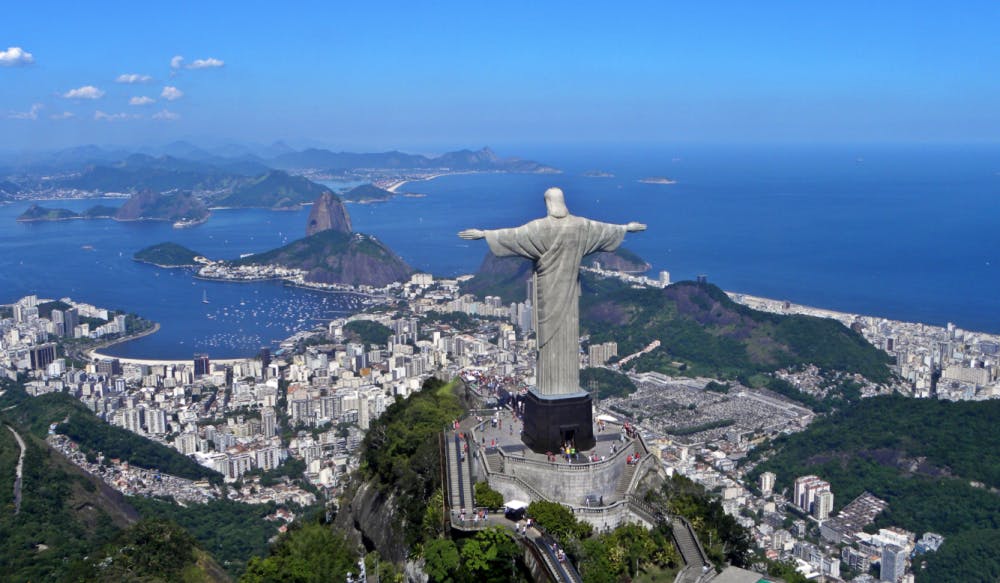The Olympic events all require remarkable athletic ability and training—but hosting these competitions could prove even more challenging.
During the past several years, Brazil has experienced political instability, economic recession and a health crisis due to the Zika virus. However, the decision to hold the 2016 Olympics in Rio de Janeiro was made in 2009, before Brazil began facing many of these problems. Professors and students recently discussed how the Games have impacted these political, economic and health controversies.
“Brazil is in a very peculiar situation as of now. It’s facing an intense political climate,” said Anirudh Krishna, Edgar T. Thompson professor of public policy. “The legitimacy of the Brazilian state is at stake with politicians being implicated in corruption cases. There’s been question marks about the effectiveness of the government of Rio and the state.”
Sophomore Eyram Klu, who was in Rio earlier this summer for a social mobility project with Bass Connections, noted that many of the locals he talked with were not happy about the Olympics happening in their home country.
“[The government is] prioritizing money for events that only wealthy and upper middle class people can attend,” Klu said. “There’s been a lot of outrage from locals who are of lower socioeconomic status.”
The unemployment in Brazil reached 11.2 percent this April, according to The Rio Times.
Klu noted that many construction and renovation projects are going on in the city. Pedro Garcia Duarte, Ph.D. in economics ‘07 and professor of economics at the University of Sao Paulo, explained that these have been beneficial for Brazil.
“There have been some improvements in public transportation—a metro and a tram line—and in reinvigorating parts of the city, with new urban interventions, besides the usual buildings related to the Olympics,” Duarte wrote in an email.
However, Krishna noted that he doubts the Olympics will provide the region with long-term economic growth. Duarte also voiced concern about whether the positives would offset the negatives.
“It is hard now to have a clear picture of the net balance of benefits and costs,” Duarte wrote. “The tourists around the world visiting that beautiful city will surely inject money into the economy, but the question is whether this will outweigh the costs of hosting the Olympics. I hope it will.”
Klu added that the economic benefits will be more advantageous for the wealthier citizens in the city, which may upset locals living in poorer areas.
The Olympics has also been marred with the threat of the Zika virus with several athletes deciding not to compete. The World Health Organization has issued a statement, which noted that "cancelling or changing the location of the 2016 Olympics will not significantly alter the international spread of Zika virus." Dr. Cameron Wolfe, assistant professor of medicine in the infectious diseases department, wrote in an email that the threat of contracting the Zika virus at the Olympics is relatively low.
“[Zika] is less prevalent [in Rio] than other parts of Brazil," Wolfe wrote. “There are areas further north that have reported more intensive transmission.”
Wolfe added that it is unlikely that athletes and travelers will bring the disease back to their home countries because the disease originates from mosquitoes.
In addition to health concerns, Brazil has faced political scandals this past year. Earlier this summer, members of Brazilian Congress began the process for impeaching president Dilma Rousseff based on allegations of kickbacks and corruption.
“The recent scandals showed that the country fell prey of systemic corruption, and several politicians involved in them are now in power,” Duarte wrote. “[The Olympics] certainly does not contribute to appeasing the political and economic situation.”
Get The Chronicle straight to your inbox
Signup for our weekly newsletter. Cancel at any time.
Class of 2019
Editor-in-chief 2017-18,
Local and national news department head 2016-17
Born in Hyderabad, India, Likhitha Butchireddygari moved to Baltimore at a young age. She is pursuing a Program II major entitled "Digital Democracy and Data" about the future of the American democracy.

